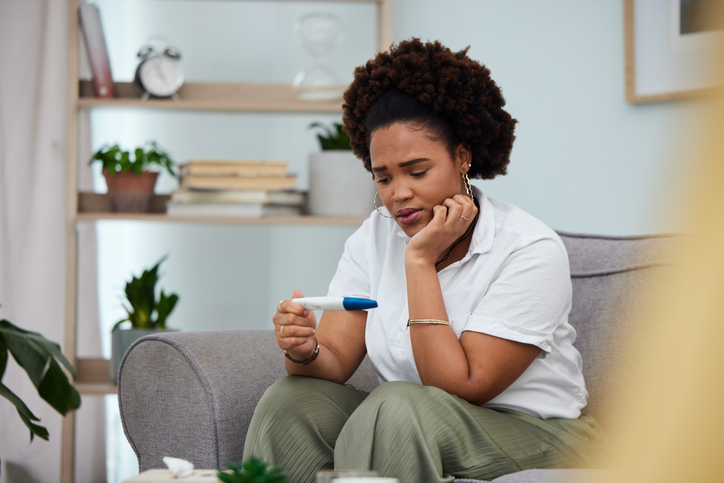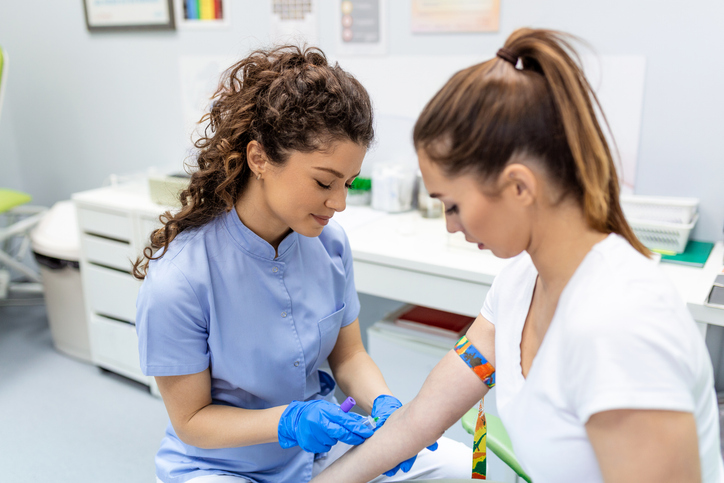After undergoing in vitro fertilization (IVF) treatment and having an embryo transfer, the two-week wait for that (hopefully) big fat positive pregnancy test can feel agonizingly long. You’ve just spent weeks taking medications, going to appointments, and putting your body through so much, all in the hopes of bringing home a baby. The stakes feel incredibly high; we know because we’ve been there.
Infertility — and especially IVF — can feel like an endless waiting game, but you’ve made it this far, and you just need to hold on a little longer. So, how soon can you actually take an at-home pregnancy test after IVF?

Urine pregnancy test after frozen embryo transfer
If you're itching to take a home pregnancy test, we get it. The most accurate time to take one after a frozen embryo transfer is around 7 days after a day-5 embryo transfer. Why? Because after transfer, it takes a few days for the embryo to implant into the uterine lining. Once that happens, your body starts producing human chorionic gonadotropin (hCG), the pregnancy hormone detected by at-home tests.
Some early-detection pregnancy tests can pick up hCG levels as soon as 5 days post-transfer, but this depends on when implantation occurs and how sensitive the test is. If you decide to test early, opt for a high-sensitivity test that detects hCG at 10-25 mIU/mL (we love this one!). However, keep in mind that testing too soon can lead to false negatives, which can be unnecessarily heartbreaking.
How soon can a blood test detect pregnancy after implantation?
Your fertility clinic will likely schedule a blood test (often called a beta hCG test) around 8 or 9 days post-transfer. Blood tests measure the exact level of hCG in your system and are much more accurate than urine tests.
According to the American Society for Reproductive Medicine (ASRM), hCG levels should ideally double every 48 hours in early pregnancy, so your doctor may schedule a follow-up test 48 hours later to ensure your numbers are rising appropriately. This series of tests helps confirm a healthy, progressing pregnancy.

Pregnancy test after embryo transfer: The pros and cons of testing early
Your doctor might tell you to hold off on at-home testing until your blood test, but let’s be real — the urge to test early is strong. Here are some things to consider:
Pros:
-
You might get an early positive result, which can bring peace of mind.
-
If testing daily, you may see a progression in test darkness, which some find reassuring.
Cons:
-
False negatives happen if you test too soon, leading to unnecessary disappointment.
-
If you had an hCG trigger shot, it could still be in your system and cause a false positive.
-
Early positives don’t always mean a successful pregnancy — chemical pregnancies and early miscarriages are unfortunately common.
If you do decide to test early, just remember that the only test that truly matters is your blood test at the clinic. Until then, don’t stop taking your prescribed medications, and try to hold onto hope.

How long after IVF implantation can I test?
The waiting game is brutal, but patience can help avoid emotional whiplash. For the best accuracy, wait at least 7 days post-transfer for a urine test or follow your clinic’s schedule for blood testing. Implantation usually occurs 6 to 10 days after ovulation, meaning that hCG levels won’t rise until implantation is complete.
Ultimately, do what feels right for you. If testing early gives you a sense of control, go for it — but take any results with a grain of salt. If waiting for the official blood test feels like the better option for your mental health, that’s okay too. Either way, we’re sending you all the good vibes and baby dust your way this cycle!
IVF pregnancy test and hCG levels post-embryo transfer
Understanding your hCG levels can help ease anxiety, especially if you're analyzing line progression or comparing beta results. Here’s a general guideline for expected hCG levels after embryo transfer:
-
3-4 days past transfer (DPT): Likely no detectable hCG yet
-
5-6 DPT: Possible faint positive on highly sensitive tests
-
7-9 DPT: Increasing chance of positive urine test
-
10-14 DPT: Stronger positive, beta hCG test confirms pregnancy
A beta hCG level above 100 mIU/mL at 14 DPT is generally considered reassuring, though lower numbers can still result in a healthy pregnancy. The key is to focus on the rate of increase, as hCG should double every 48 hours.
The IVF journey is filled with uncertainty, but knowing what to expect during the two-week wait can make it a little more manageable. No matter what, you are not alone in this. We see you, we support you, and we’re cheering you on every step of the way!
Brighid Flynn is a freelance writer based in Philadelphia where she lives with her husband and puppy. She is just beginning her journey toward motherhood.






.jpeg)

.png)








